

American Academy of Pediatrics issues policy statement on pesticide exposure in children. High resolutionClick to expand Marcy Harrington A child picks flowers during a walk outdoors.
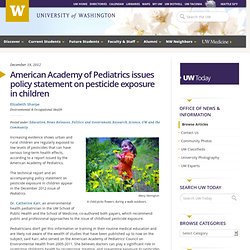
Increasing evidence shows urban and rural children are regularly exposed to low levels of pesticides that can have serious long-term health effects, according to a report issued by the American Academy of Pediatrics. The technical report and an accompanying policy statement on pesticide exposure in children appear in the December 2012 issue of Pediatrics. Dr. Pediatricians don’t get this information or training in their routine medical education and are likely not aware of the wealth of studies that have been published up to now on the subject, said Karr, who served on the American Academy of Pediatrics’ Council on Environmental Health from 2005-2011. High resolutionClick to expand Alice C. A little girl at play in a garden. The ubiquitous chemicals are as varied as their uses. The dietary contribution from food residues provides cumulative, chronic exposure. High resolutionClick to expand. Protecting the Next Generation - Organic Trade Association.
Organic agriculture minimizes children’s exposure to toxic and persistent pesticides in the soil in which they play, the air they breathe, the water they drink, and the foods they eat.
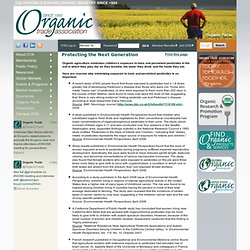
Here are reasons why minimizing exposure to toxic and persistent pesticides is so important: A recent study of 600 people found that those exposed to pesticides had a 1.6 times greater risk of developing Parkinson’s disease than those who were not. Research demonstrating the harmful effects of toxic and persistent pesticides dates back many years: A study to assess preschool children’s organophosphorus pesticide exposure in the Seattle Metropolitan area made an interesting discovery: the only child whose urine contained no measurable pesticide metabolites lives in a family that buys exclusively organic produce and does not use any pesticides at home.
The Organic Trade Association is the leading business association representing the organic industry in the United States, Canada, and Mexico. Why Children May be Especially Sensitive to Pesticides. Infants and children may be especially sensitive to health risks posed by pesticides for several reasons: their internal organs are still developing and maturing, in relation to their body weight, infants and children eat and drink more than adults, possibly increasing their exposure to pesticides in food and water.
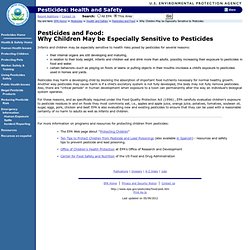
Certain behaviors--such as playing on floors or lawns or putting objects in their mouths--increase a child's exposure to pesticides used in homes and yards. Pesticides may harm a developing child by blocking the absorption of important food nutrients necessary for normal healthy growth. Another way pesticides may cause harm is if a child's excretory system is not fully developed, the body may not fully remove pesticides. Also, there are "critical periods" in human development when exposure to a toxin can permanently alter the way an individual's biological system operates.
Hormones in milk, beef, could put kids at even higher risk. Kathryn Perrotti Leavitt/Children’s Health Environmental Coalition Rose Welch has a 3 1/2-year-old son Adrian who was breastfed for the first few years of his life and now drinks only organic milk and eats only organic food.
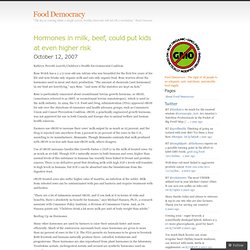
Rose worries about the hormones used in meat and dairy production. “The amount of chemicals [and hormones] in our food are horrifying,” says Rose. “And none of the statistics are kept on kids.” New Harvard Research Shows Link Between ADHD and Pesticides. By Stephanie Dearing.
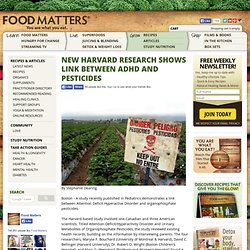
Boston - A study recently published in Pediatrics demonstrates a link between Attention Deficit Hyperactive Disorder and organophosphate pesticides. The Harvard-based study involved one Canadian and three American scientists. Titled Attention-Deficit/Hyperactivity Disorder and Urinary Metabolites of Organophosphate Pesticides, the study reviewed existing health records, building on the information by interviewing parents. The four researchers, Maryse F. Study Links ADHD in Kids to Pesticide Exposure.
Studies linking environmental substances to disease are coming fast and furious.
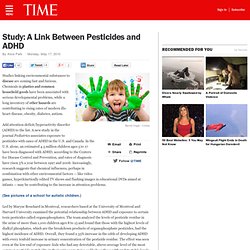
Chemicals in plastics and common household goods have been associated with serious developmental problems, while a long inventory of other hazards are contributing to rising rates of modern ills: heart disease, obesity, diabetes, autism. Add attention-deficit/hyperactivity disorder (ADHD) to the list. Maria Rodale: The Top 10 Reasons Why Every Kid Needs Organic Food. Avoid Synthetic Hormones in Food. February 26, 2013 Hormones are responsible for much more than just acne in teenagers and mood swings in pregnant women.
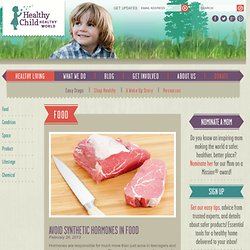
They are the messengers for much of your body’s functioning, including growth and development, immune response, regulation of metabolism, and reproduction among other things. The body creates its own hormones to take care of these vital duties, but many synthetic chemicals also mimic hormones. Some are intentionally developed to do so, like birth control pills or recombinant bovine growth hormone (rBGH) and others accidentally disrupt hormones, like bisphenol-A and phthalates.
And, whether natural or synthetic, hormones are powerful. The Institute for Agriculture and Trade Policy has a Smart Guide that addresses the issue of hormones in the food system. Plenty of uncertainties still remain about the impacts associated with these substances, but preliminary studies paint a disturbing picture. 1. 2. 3. 4.